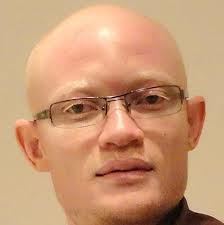In Africa, for once, free debate on LGBT issues, much more
Colin Stewart is a 45-year journalism veteran living in Southern…
The first of a series of dispatches by the Rev. Canon Albert Ogle on efforts to protect human rights of LGBT people by working with the African Commission for Human and Peoples’ Rights, currently meeting in the Gambia, West Africa.
These are excerpts from Ogle’s column:
What I learned in The Gambia at human-rights conference

Last weekend, I attended the 54th meeting of the African Commission on Human and People’s Rights and a packed agenda for 200 representatives of Non Government Organizations (NGOs). This all took place under a huge portrait of the Gambian President Yahya Jammeh, who recently used his precious time at the opening of the UN General Assembly to condemn the LGBT community.
“‘Those who promote homosexuality want to put an end to human existence,” Jammeh told the gathering of world leaders in New York. “It is becoming an epidemic and we Muslims and Africans will fight to end this behavior.”
“Homosexuality in all its forms and manifestations which, though very evil, antihuman as well as anti-Allah, is being promoted as a human right by some powers,” said Jammeh, who is accused by activists of human rights abuses during his rule. Full article HERE.
Mama Fatima Singhateh, his Attorney General, the Minister of Justice, officially opened the conference, and it was bizarre for the host country where the African Union’s human-rights body has their secretariat and annual conference, to be one of the first countries on the agenda to be critiqued for its own human-rights abuses. Yet, there was also something very healthy about the level of openness and discourse at this meeting.
Discussion and debate is not censored at this level, though it was noted by several speakers that more and more African leaders do not allow criticism at home and the real threat to democracy in many African countries is emerging anarchy. So this is one of the most important for officials to talk about issues that cannot be talked about at home.
The meetings dealt with gender inequality and violence, refugees, prisons, the International Criminal Courts, economic and social rights, the LGBT community and one of the most recent African communities to seek greater attention and protection, people with Albinism.
An emerging new minority in Africa

We met two extremely organized and articulate advocates who are both people who live with Albinism. There is a variety of attitudes to this minority African population that is surrounded with shame, fear and often subject to violence. There has been increasing violence directed towards them, almost as a kind of culturally acceptable sport.
These children are often born into poor and uneducated families and if they survive birth are treated as social freaks and outcasts. Abdallah Possi, an attorney from Tanzania, reported that 130 deaths were reported of people who live with Albinism in Tanzania alone, with three times this number of recorded acts of violence or persecution. Part of the mythology is that people who live with Albinism (PWA) never die and they go off into the mountains to live forever.
In Cameroon, where the attitude toward LGBT people is extremely hostile, the local community living with Albinism is protected under disability laws and there is more understanding and compassion. In many ways, the presence of the LGBT community at this conference is a sign of progress and encouragement to an even more invisible and stigmatized community like people who live with Albinism.
I was impressed by the level of engagement and acceptance of such a range of people and the level of discussion, a clear expression of the ideals and realities of human rights work in Africa and the respect for due process that the instruments and agreements established by the African Union itself will have a positive impact upon a continent still ravaged by poverty, disease and exploitation.
For more information, read the full column in the San Diego Gay and Lesbian News: “RGOD2: What I learned in The Gambia at human-rights conference.”
Related articles
- Steps toward LGBT equality via D.C., Rome, the Gambia (76crimes.com)
- East African Witch Doctors Are Hunting Albino Children to Amputate Their Limbs and Turn Them into Magic Potions (patheos.com)
- UN human rights office unveils gay-rights campaign (bigstory.ap.org)
- Ritual Attacks on People Living With Albinism Go Largely Uninvestigated (blogs.smithsonianmag.com)
- Report: Anti-gay laws harm African economies (76crimes.com)



People around the world face violence and inequality – and sometimes torture, even execution – because of who they love, how they look, or who they are.
Sexual orientation and gender identity are integral aspects of our selves and should never lead to discrimination or abuse.
Lesbian, gay, bisexual, and transgender people’s rights, with activists representing a multiplicity of identities and issues.
This are some of the keywords of LGBT people are facing right round the global, more like in African.
Torture, killing and executions, arrests under unjust laws, unequal treatment, censorship, medical abuses, discrimination in health and jobs and housing, domestic violence, abuses against children, and denial of family rights and recognition.
The truth about LGBT is that Africans are far behind on the road to LGBT rights. Talking openly about LGBT rights is still a taboo, let alone admitting that one is a gay, bisexual or lesbian. At present, persecution, molestation and provocation area what LGBT`S or their sympathizers face.